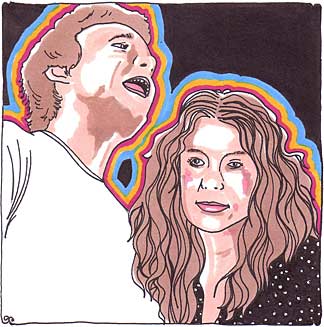- Welcome to Daytrotter
- Breaker
- Violent Past
- In Silence
- Sandinista
Escapism is for weenies. It’s for people who gladly pay $9 to see a motion picture in a theater chilled so harshly that their cheeks pink and their toes blue. It’s for the fantasy farmers, mining for the tunnel to China or hunting for a saber tooth tiger or a leprechaun with a powerful ring that all in the universe covet. It’s for popcorn and Goobers eaters. It’s not for the people, the mellow as a candle people that Duluth, Minnesota’s Low draw to their robust-free compositions of exploratory sorrow on parade. They hit the glamour subjects of titillating moroseness, the efforts that get tangled in the sticky albatross of the “what’s to become of this terrible trouble we find ourselves in” worry. Though, there’s no remorse or restlessness about the predicament.
The latest Low album — Drums and Guns, finds Alan Sparhawk trimming away the fat, all that could be construed as sensationalism and extravagant buildup (but when has the man ever been supportive of that form of expressionism?) to make a record that speaks to the inescapable, harried plight of the person resigned to the incontrollable forces that seem to cling to the bodies that just go about handling them the best they can.
That which cannot be reversed is absorbed into the bloodstream and then the marrow takes a sip, siphoning in the easy, heartbreaking tumble of the hardscrabble and it’s gone for a spell, coming to grips that there are no escape hatches for those who just don’t want to play. Low, for almost 15 years now, have relied on something that’s by no means lethargy, but which is also by no means exuberance. It exists as a reflective passion for truth as it occurs to the grounded, those who also frequently come across as the fallen or teetering – scheduled to fall with a puff of air.
Sparhawk explores miseries that have come to live with themselves and see themselves for much less dramatic fare — for the cooler variation of livid and kicking and screaming. It’s a variety of struggle that just goes comfortably limp to the touch, but goes forth, courageously making the rounds. It’s not really going through the motions, because that admits to total defeat. The emotions that Sparhawk taps for his minimalistic shadings of darkness are exhausted of the old college try, but they maintain a flame of something essentially unknown, probably primal and so ingrained that it still gives scientists and behaviorists fits, whenever they attempt to put their thumbs on it. It’s a feeling that’s neither arcane or mysterious, but more exceptional for its shaky sturdiness. It’s an admittance to a c’est la vie type of life, with slightly more fight left in the tank.
Sparhawk, his wife Mimi Parker (her gorgeous harmonic offerings and revealing, barebones drumming) and bassist Matt Livingston make war with the fighting and politics of our American times, disguising it all as something else. They create an atmosphere all their own, which bargains with darkness and lightness, perceived good and perceived evil, real good and real evil and then sets the man alone, standing at a crosswalk that, when looked across, has no other side. Rather than stay where he is, Sparhawk takes his characters for a stroll when the time seems right, even with them sensing all of the futility of the progress in every gentle step.
